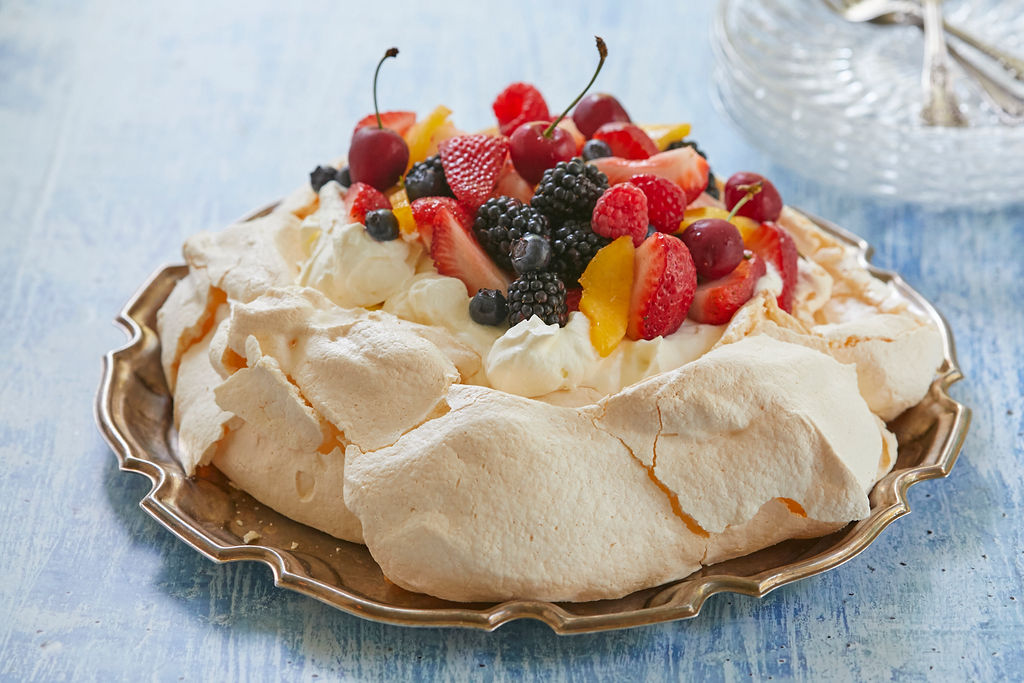
This post may contain affiliate links. Please see my full disclosure for details.
Hi Bold Bakers!
Pavlova is a dessert that, to my delight, is becoming more popular around the world. Pavlova is a gorgeous billowy meringue that is crisp on the outside and marshmallow-like in the center when made just right. With my 5 simple steps, I’m going to show you how you can achieve the Perfect Pavlova every time!
5 Simple Steps to Making The Perfect Pavlova
1) The eggs you use should be:
- Room Temperature: Start out with room temperature, fresh egg whites. Room temperature eggs whip up so much better than eggs straight from the fridge.
- Fresh: Also, the freshness is important as fresh eggs are stronger and will whip up better and hold the air better.
2) Apart from egg whites, you need:
- Fine Sugar, castor sugar, or in the States, it’s the regular sugar you use for coffee. Fine sugar dissolves better into the meringue.
- Cornflour (cornstarch): Cornflour stabilizes egg whites during baking and prevents weeping. Less is more, however, as too much cornflour can give the meringue an unpleasant chalkiness – like in plenty of store-bought meringues. Generally, one teaspoon per egg white is a good amount to add.
- White Vinegar: Adding an acidic ingredient also stabilizes the egg white foam and can prevent problems such as a mixture that splits.
3) Whipping your egg whites:
- Start it on low for 2 minutes until the egg whites start to foam and begin forming bubbles. Then turn up the speed and whip to soft peaks (see video below). This just gives the egg whites time to stabilize.
4) How to add the sugar:
- Slow it down: Add the sugar spoonful by spoonful when the meringue is whipped to soft peaks — and only then. Be patient when gradually adding the sugar to the egg white. Each tablespoon of sugar should be dissolved before the next is added. It is ready when it’s thick, glossy, and smooth.
5) Timing and temperature for baking Perfect Pavlova:
- Baking: Bake at 250°F (125°C) for 1hr 30min. Then, dry it out in the oven for up to 3 hours. The combination together along with the size of the pavlova will give you the crisp meringue shell and the soft center.
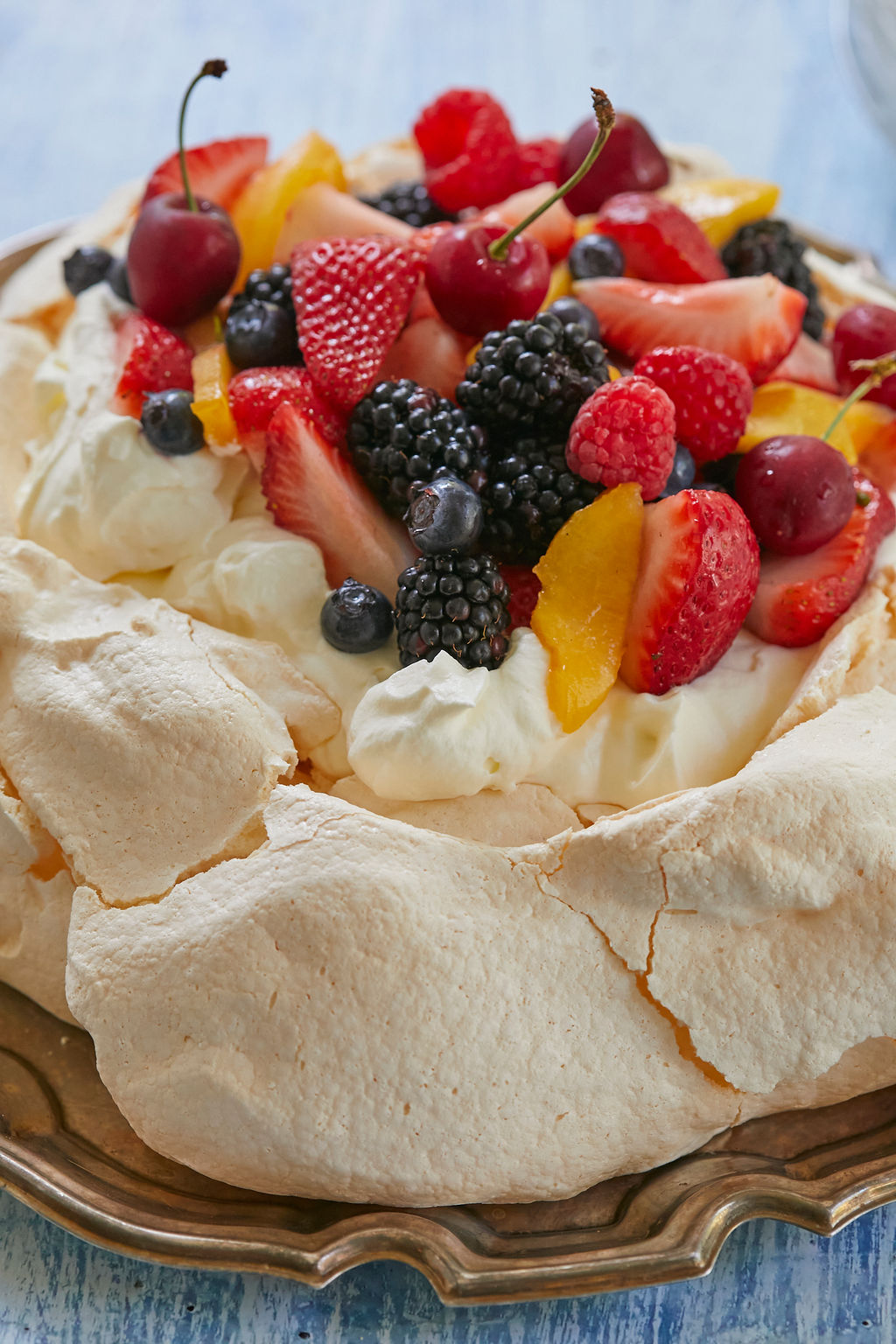
Why Pavlova Can “Weep”
Meringues are full of sugar, so if the humidity is high, they’ll absorb moisture from the air, which can make your meringue weep or go soft and sticky after baking. Reduce the risk by including cornflour.
Why Pavlova Cracks
This is common so don’t feel bad, all is not lost! Often it happens due to the change in temperatures. Pavlova can crack when they cool too quickly. Leave them in the oven after baking with the oven turned off to slow the cooling process and help avoid it breaking.
Also, keep it in the oven to cool down slowly rather than take it out and the temp change cracks it. I leave mine in there overnight.
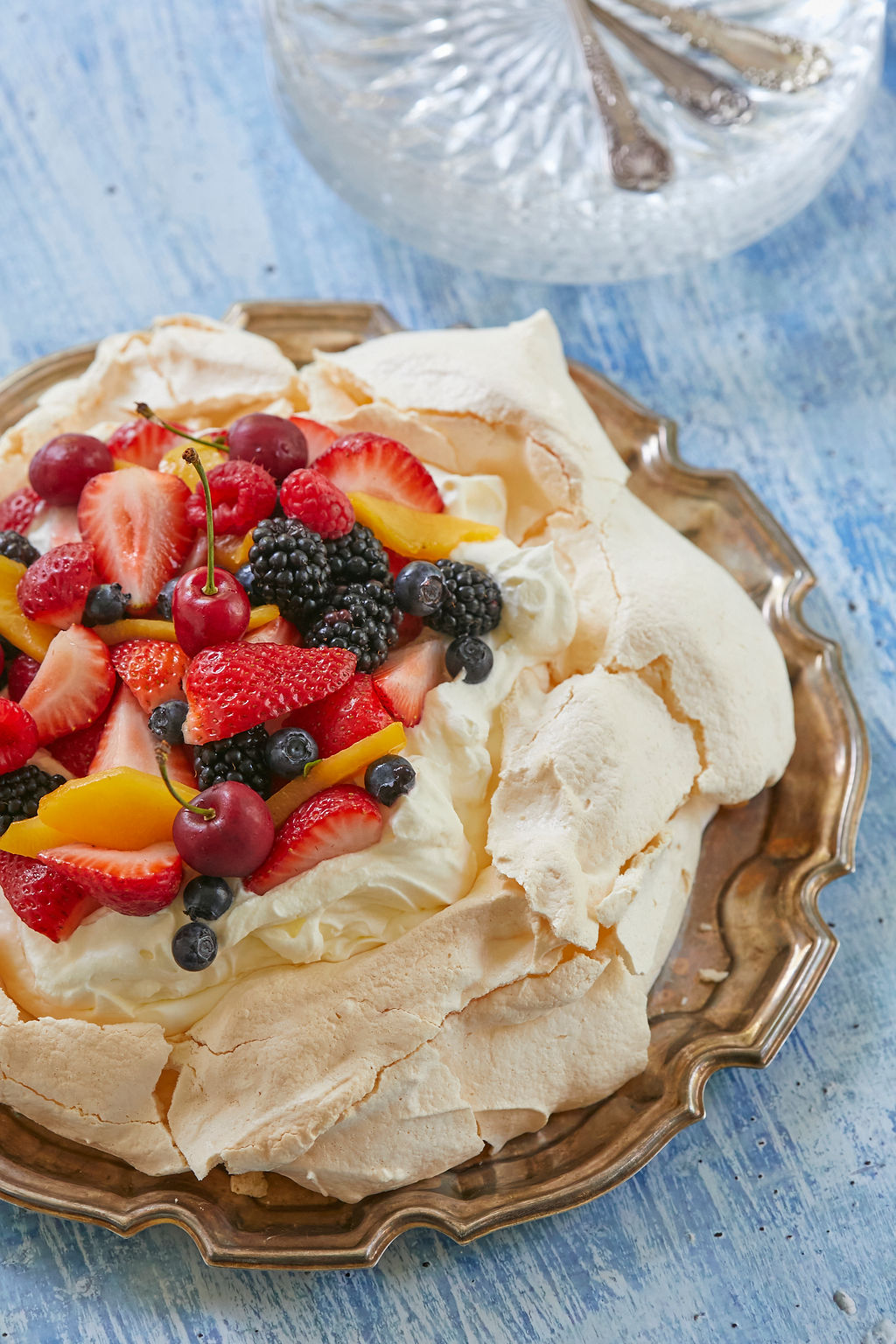
The Perfect Bake-Time For Pavlova
Often people think it’s for hours and hours, but really it just takes about 90 minutes for this large Pavlova. Now, you will want to dry it out in the oven after baking, however, and those instructions are written in the recipe below.
How To Know When Pavlova Is Done
You can tell when a Pavlova is done when it lifts off the parchment paper easily. If it doesn’t come away, keep cooking and keep an eye on it.
How Long Pavlova Keeps — And How To Store It
Pavlova is to be kept in the fridge once you put toppings on it, and because of its soft texture, it is best that once you decorate it that you serve it the same day. After a few hours will it begin to soften and lose its crispness.
Can I Substitute the Eggs in Pavlova?
Yes, you can make a light-as-air yet vegan-friendly meringue base for meringue nests using my Vegan Meringue Recipe.
Don’t forget to check out The Complete Guide to Aquafaba to utilize this amazing egg substitute in baking!
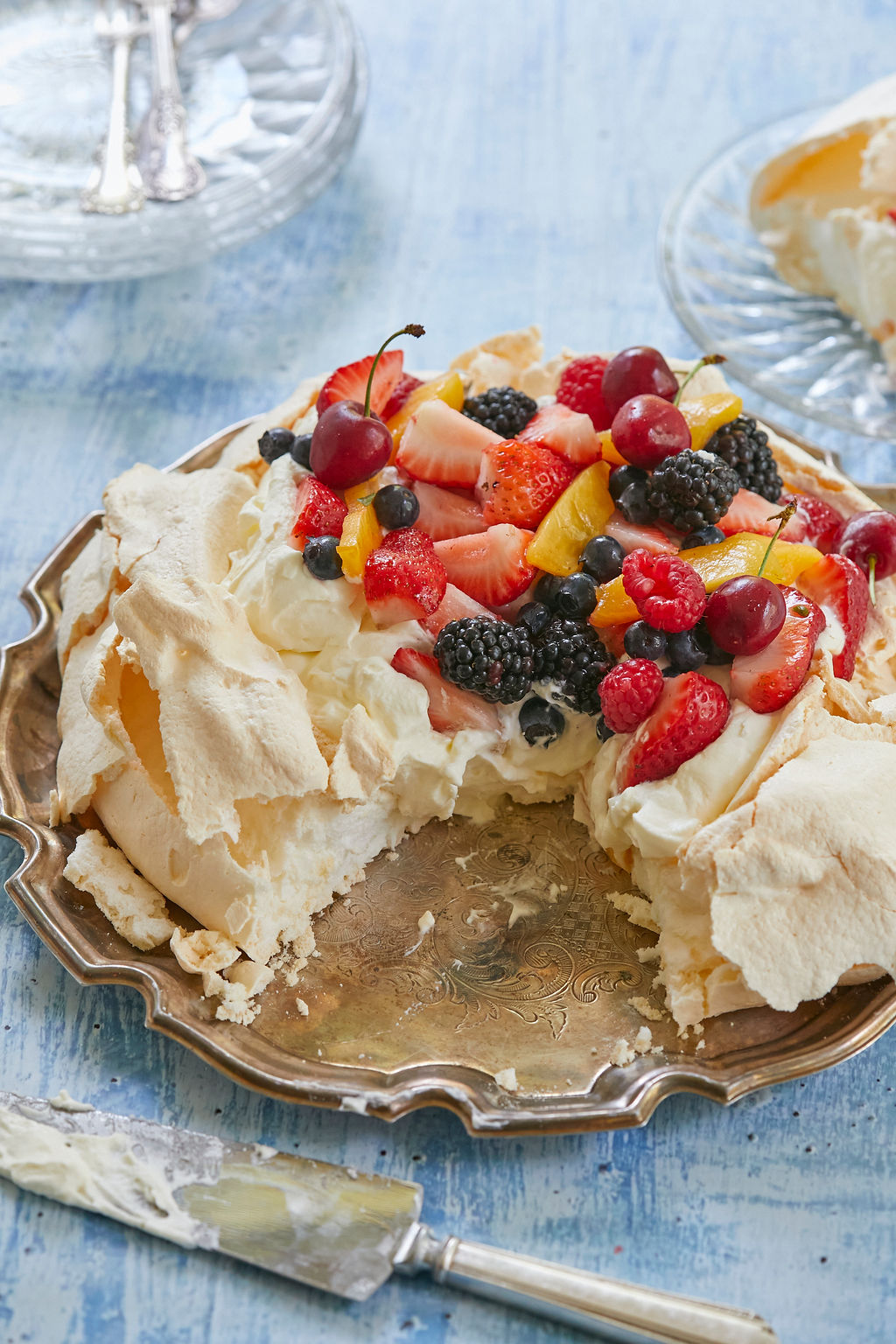
Make More Fine Desserts
And don’t forget to buy my Bigger Bolder Baking Cookbook!
Watch The Recipe Video!
The Perfect Pavlova Recipe
Ingredients
- 4 large (5½oz/160g) egg whites*, at room temperature
- 1 cup (8oz/225g) sugar
- 2 teaspoons cornstarch
- 1 teaspoon white vinegar* (see notes below)
- 1 ½ cups (12floz/340ml) heavy whipping cream, whipped
- 20 strawberries, sliced
- 3 kiwis, sliced
- 1 passion fruit, scooped
Instructions
- Preheat the oven to 300°F (150°C). Line a cookie sheet with parchment paper.
- Using an electric stand mixer or hand mixer, whip egg whites in a clean bowl for 2 minutes on low speed until bubbles start to form.
- Turn the machine up to medium-high speed and continue whipping until the egg whites start to reach soft peaks, roughly 2-3 minutes.
- In a small bowl add the sugar. To this add cornflour and the vinegar. (see video for step by step)
- Slowly start to add the sugar 1 tablespoon at a time until it is all incorporated. You will see the egg whites double in volume and get shiny. Continue mixing for 2 more minutes and then turn off the machine.
- On the cookie sheet, spread out the pavlova into a 10-inch round. Make the dip in the middle where you will spread the cream.
- Turn down the oven to 250°F (125°C) and bake the Pavlova for 1hr 30 minutes. After that time, turn off the oven but leave it in the oven to dry out for 3 hours. (or overnight like I do)
- When you are ready to serve, dollop whipped cream on top of the Pavlova and top with Sliced strawberries, sliced kiwi, and some passion fruit. Keep refrigerated and enjoy within 2 days.

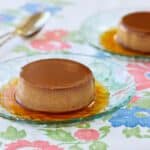

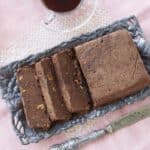
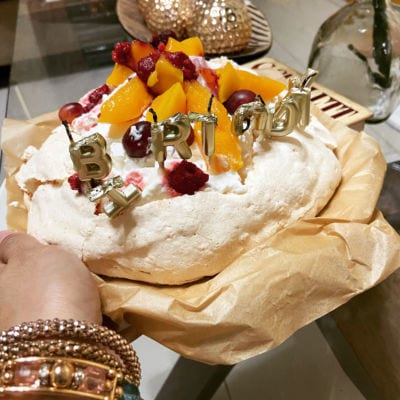
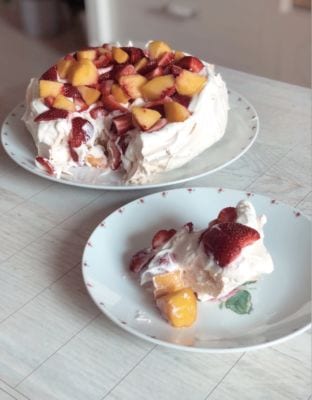
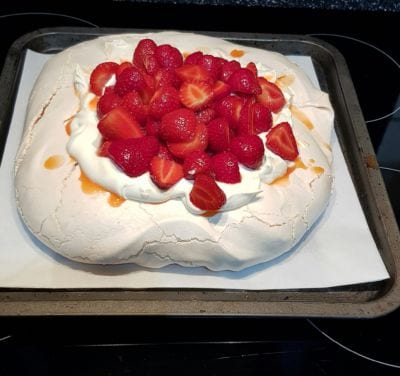
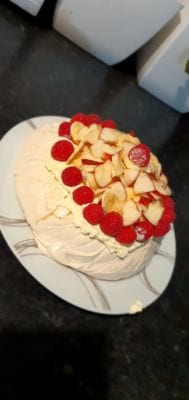
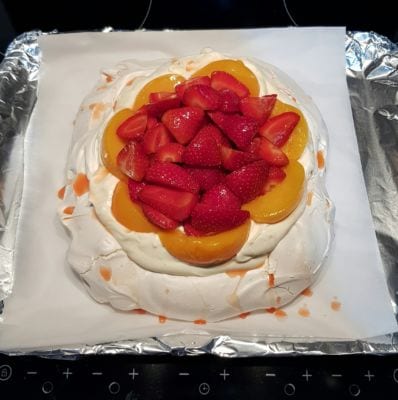
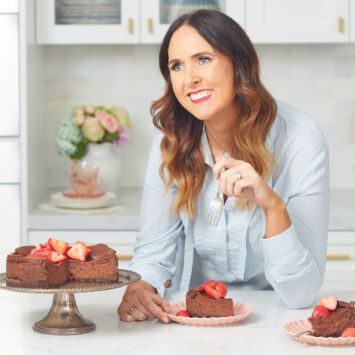

Hi Gemma I have made pavlova before and in the recipe I use it uses vanilla extract does it make a difference, thanks tricia
This was super easy and absolutely delicious! Thanks for this recipe.
I have never made meringue before much less something like a Pavlova. But I had a lot of egg whites left from making custard and rather than throw them away, decided to make a Pavlova which I’ve never had before and not something you can just buy locally. Thanks to the easy and detailed instructions in this recipe and the video, I was able to make a Pavlova on the first try! Thank you for sharing this recipe, Gemma. The only caveat I would have for other bakers is to make sure the humidity in your kitchen is in the… Read more »
Love pavlova but never made one so I will have a go.
can we have some ideas what do you do with the 4 egg yolks, please 🙂
My mixture keeps ending up quite liquidy. Any thoughts as to why this might be ?
Hi Gemma, is it possible to make a pavlova with a cup for cup sweetener such as Monkfruit with erythritol? Thanks!
I’m loving trying your recipes!! (And so is my husband! 😉☺️). Question though… I think I’ve gained 5 pounds just looking at your recipes today.. how do you and your husband stay thin with all your incredible baking?!
Thank you for sharing your expertise with us. 😁
Excellent recipe Gemma, thank you.
Hi Gemma, I’d like to try this recipe for individual size pavlovas. How many mini pavlovas do you think this would make? And how ling should I bake them?
Hi Gemma, I tried the pavlova recipe,but the exterior didn’t get crispy. Is it possible that I over whipped the egg whites. The inside was fluffy but the outside was more chewy. Thanks!